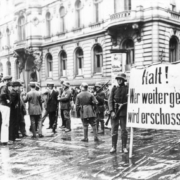Putsch
The German word Putsch has been adopted into English to describe the sudden overthrow of a government, usually planned by a small group, and involving force or the threat of force. Putsch in English is a recent but popular alternative to the word coup, short for coup d’etat which English had imported from French, as English lacks a concise term to denote the decapitation of the state by power-seeking insiders. Putsch means a blow or shove in the original Swiss-German, and came into wider usage to describe popular uprisings in Switzerland in the 1830s and then later events in twentieth century Germany.
A coup d’etat, literally a blow against the state, is a forced overthrow of the current government by a minority, usually illegal and backed by military action or the threat of it, and typically leading to government by the military or persons appointed by the military or appointed by the violent insurrectionists. A coup can be an ambiguous term in English without proper context – the French word means a blow, but coup in English can mean a “singular success” such as getting a scoop, as well as being short for coup d’etat. A coup may also be bloodless, with the media commonly referring to a “palace coup” or “administrative coup” or “boardroom coup” to describe changes in power relationships. In those contexts the term putsch could work as well, but would sound a bit stronger to many.
In wider usage putsch in English has come to be an informal shorthand term for the surprise removal, or attempted removal, of a leader of any kind by an organised group or conspiracy, who may even be in the leader’s own political party or organisation. The term has the additional attraction of sounding very like the English word push, so organising a putsch equates to “giving someone the push”, meaning sacking them or removing them from their position. Participants in a putsch can be called putschists, and a failed putsch can become famous in its own right, with perhaps the most famous being the Beer Hall Putsch in Munich in 1923.



 https://creativecommons.org/licenses/by-sa/3.0/deed.en
https://creativecommons.org/licenses/by-sa/3.0/deed.en